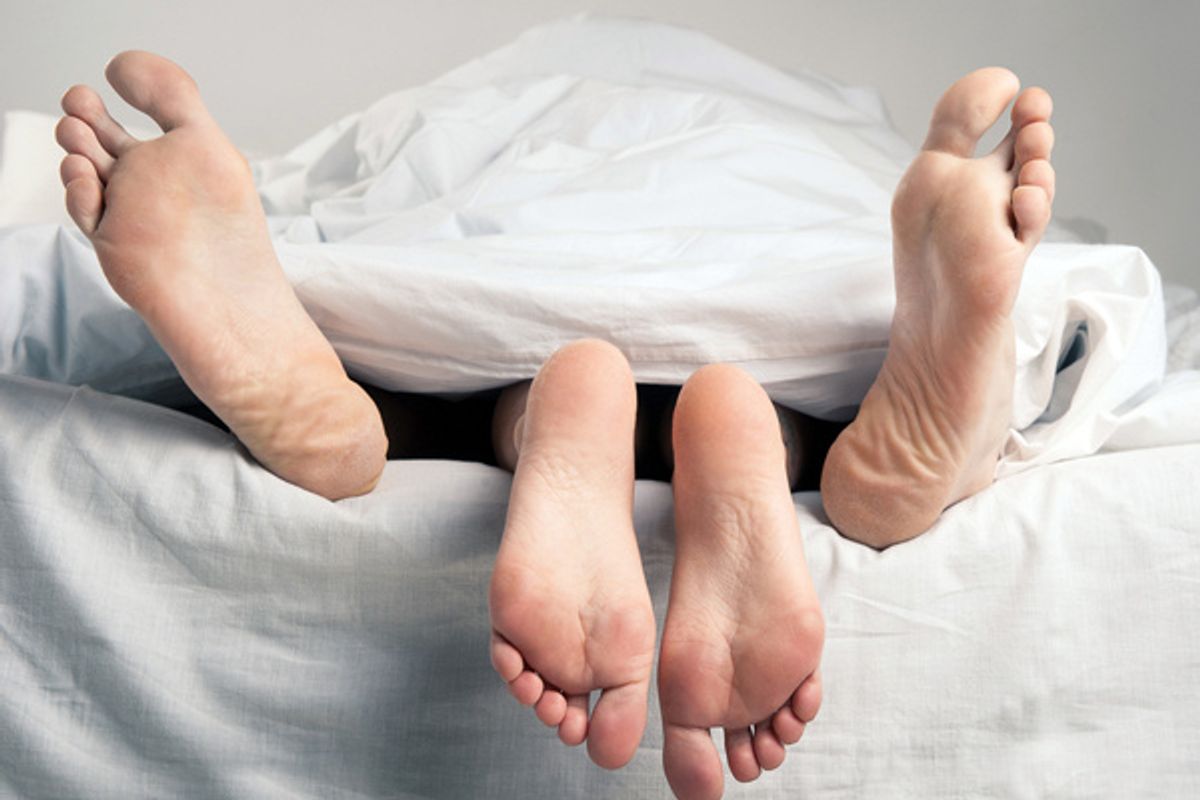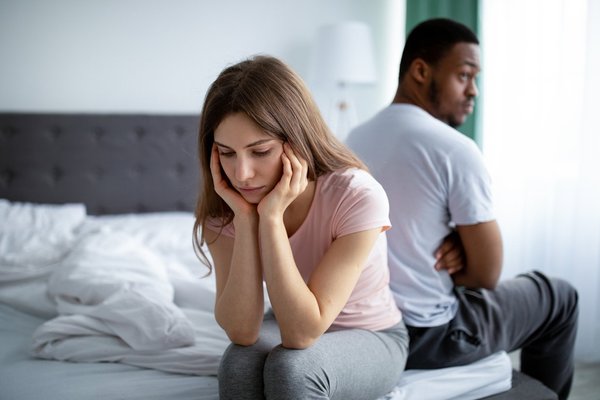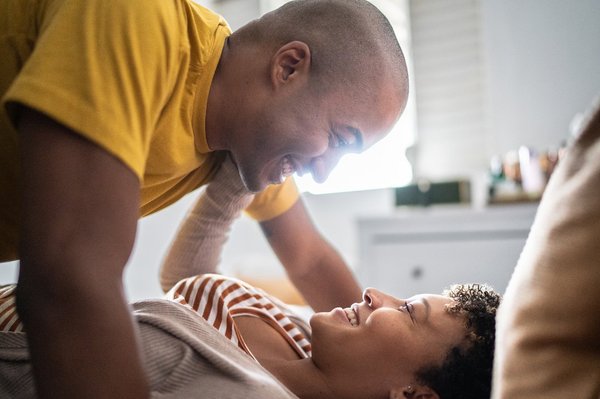This article has been archived. We will no longer be updating it. For our most up-to-date information, please visit our menopause hub here.
The most common myth is that once a woman goes through menopause, she becomes asexual and dried up and no longer interested in sex. Nothing could be further from the truth!
—Gynecologist Dr. Donnica Moore
The benefit older women experience is that once the responsibilities are gone, it's a great time to regain passion for life, love and sex. Older women are having the best sex of their lives—it's all about sexual self-discovery and growth.
—Sex therapist Dr. Shannon Chavez
OK, so here we are: women of a certain age who, by now, are wise enough to know a thing or two about recognizing life's challenges and taking take care of ourselves. I'm pretty confident that I can count on the fact that the majority of us have experienced, discussed, suffered through, put up with, mastered one or more of the following: hot flashes, mood swings, difficult people, challenging circumstances, empty nest, death, divorce, downsizing, weight gain, bloat, illness, pain, health scares, health threats, having "work" done, becoming an in-law, losing a pet, losing your waistline, losing your keys. Feel free to add to the list.
Think about it. There are so many challenges that occur in a short time, usually around the menopausal years.
But there's something that many women never expected, and, if they did, they are not quite sure how to confront it: painful sex. I had the pleasure of interviewing two experts I met one evening at an educational event in New York City on this subject that many women are hesitant to discuss.
If you want to take charge of (and enjoy) your sex life, here are some insights from Donnica Moore, MD, a highly regarded woman's health expert and advocate and president of the Sapphire Women's Health Group with an impressive bio too exhaustive to list here, and Shannon Chavez, PhD, a dynamic and brilliant sexual health expert with a private practice in Beverly Hills, California, specializing in marriage and family therapy.
SK: What are some physical problems women face during and after menopause that affect their sexual drive as well as the actual act of sex?
DM: The most infamous symptoms of menopause are hot flashes and their nighttime counterpart, night sweats. These can be disruptive to a woman's sleep, as well as her libido. But the menopausal symptom most likely to interfere with a woman's sex drive? That's vaginal dryness. The condition is called vulvovaginal atrophy (VVA) … which results from a lack of estrogen and the resultant thinning in the tissues of the vagina.
SK: What are the implications of VVA?
SC: The vaginal tissues go from plump, lubricated and pain-free to dry, smaller in size and more prone to irritation and infection. When a woman loses vaginal secretion, it takes even more time to lubricate when sexually aroused. She may also experience reduced clitoral sensitivity, less orgasmic intensity or even the loss of ability to orgasm. Intercourse becomes associated with pain—not pleasure. Women describe the sensation from these changes as "sharp, stabbing pain" and irritation in the tissue, both internally and externally.
SK: How long can women expect these problems to last? I'm sure it's different for everyone, after all.
DM: In approximately 80 percent of menopausal women, hot flashes usually resolve within five years. However, VVA only worsens over time—unless it's treated.
SC: Every woman experiences menopause differently; some experience changes gradually, some all at once, and others, not at all. Unfortunately, there's no menopause manual and time clock that can predict what will happen when. We also have to take into account the roles of nutrition, stress, health problems, family history, chronic illness and premenopausal health when considering the duration of menopausal changes.
SK: OK, it's solution time. Vaginal dryness and changes seem inevitable. Are there ways to deal with them or maybe even slow progression?
DM: Lubricants [and vaginal moisturizers] can provide some symptomatic relief (but don't actually treat the underlying problem). There are various forms of estrogen therapy, both systemic, like pills, patches or gels, and in vaginal cream form. And now, there's a new non-estrogen oral therapy to treat moderate to severe painful sex due to menopause, called Osphena [ospemifene tablets].
SC: The main treatment for decades was an estrogen replacement therapy called Premarin [also, Prempro and Premphase], which was marketed to women as a way to "preserve your femininity" and ease everything from hot flashes to anxiety. But once research found that long-term estrogen replacement therapy increased a woman's risk of breast cancer and affected libido (many women reported loss of sex drive and desire), there was a push for more holistic and hormone-free treatments for menopause, like Chinese herbs, acupuncture and bioidentical hormone therapy. Other treatments include DHEA suppositories (inserted in the vagina daily) and an all-organic cream called Sex Butter, which can naturally moisturize, coat and heighten sensation; it reduces pain and works to address vaginal atrophy.
SK: With all the changes—and options—it seems that there's an opportunity for women to take charge or their sex lives and turn things around. But first, we have to relearn the "language of sex" and find the best professionals to talk to.
DM: For many women, menopause may be the first time they've had to discuss sexual problems or symptoms with their partners or physicians. But aside from being unprepared for having these symptoms, many women are unprepared for the conversation. In general the best physician is the one with whom a woman has the closest relationship; very often that's her gynecologist. But it could also be her family physician or her internist. Here are some of the most common terms menopausal women need to learn:
- Hot flashes
- Night sweats
- Vaginal dryness
- Vulvovaginal atrophy
- Lubrication
- Libido
- Incontinence
- Erectile dysfunction
- Anorgasia (inability to achieve orgasm)
SC: In my opinion, the best type of physician is one trained in sexual health and human sexuality. They're more likely to be prepared to answer questions women have around different stages of their sexual life span. An integrated team can include gynecologists, sex therapists, naturopaths and pelvic floor physical therapists. As a woman ages, her pelvic floor tone naturally decreases and can reduce the intensity of orgasms and arousal. Kegel exercises can strengthen the pelvic floor and increase blood flow to the genital tissue to enhance orgasms.
You might also want to read:
Women and Libido at Midlife
Sex and a Healthier You Articles
What's REALLY Causing Your Low Sex Drive?







